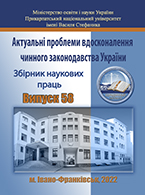Criminal-legal policy of protection of results of official sports actions: comparative aspect
DOI:
https://doi.org/10.15330/apiclu.58.57-68Keywords:
criminal law policy; corruption; sports competitions; manipulation; sportsman; support staff.Abstract
The article emphasizes the importance of eradicating corruption, manipulating sports competitions and other types of abuse in sports, which is part of the state policy to combat corruption in general and involves the implementation of the most severe type of responsibility - punitive. A comparative analysis of the criminal law policy of protection of the results of official sports events in the CIS countries (Latvia, Lithuania, Belarus, the Russian Federation, Moldova, Georgia, Armenia, Azerbaijan, Kyrgyzstan and Tajikistan) is presented. It is established that criminal laws, as a common generic object of criminal law protection in manipulations in sports competitions, determine the ownership / procedure for carrying out business or other economic activities. In some cases, the generic object of criminal protection is detailed with the help of specific objects. To indicate a prohibited rule, a foreign legislator provides for two types of behavior: active (bribery, transfer, provision, coercion, persuasion, encouragement, instruction, offer, promise, demand, mediation) and passive (receiving various items of illicit gain). The peculiarity of the definition of the subject of the offense by mechanistic recalculation of all its possible types directly in the disposition of the norm, which leads to overloading of its structure.
Proposed changes to the current version of Art. 369-3 of the Criminal Code of Ukraine due to: 1) expansion of the list of qualifying features with an indication of the commission of a crime within an organized group / criminal organization; large and especially large amounts of illegal profit; 2) consolidation of a special type of exemption from criminal liability, the conditions of application of which will be the voluntary appeal of a person to authorized entities with information about the event of the crime; the fact of recourse to the moment of bringing a person to criminal responsibility; active assistance in crime detection / investigation.


